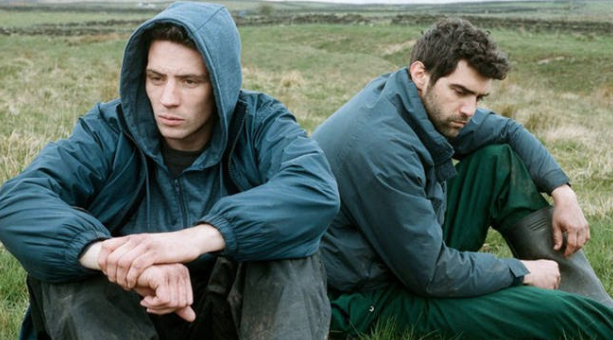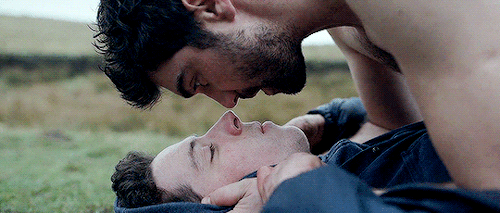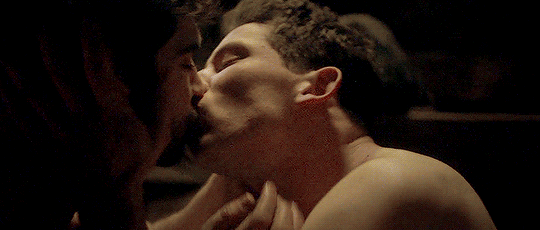Look back: "God's Own Country"
 Saturday, December 5, 2020 at 7:19PM
Saturday, December 5, 2020 at 7:19PM by Matt St Clair

The beauty in God’s Own Country, the marvelous directorial debut from Francis Lee whose newest film Ammonite has hit VOD, is not just in the luscious landscapes. It's also in the silence. The two lead actors use their facial glances and body language to confess their infatuation. Minus the ending, there’s no cathartic monologue spoken by either John (Josh O’Connor) or Gheorghe (Alec Secareanu). No 'I love you's because the words aren’t needed. Nor is this a typical “coming out” narrative present within the realm of queer cinema where the characters come to a gradual realization about their sexualities.
It’s clear when God’s Own Country begins that John is already aware of his sexuality. He engages in hedonistic hook ups for minor fulfillment. He acts out sexually but without intimacy and definitely without kissing. When Gheorghe arrives to help John and his family on their Yorkshire farm, their bond initially starts with wrestling in the mountains...

Gheorghe shows John that there’s no harm in emotional attachment with a simple touch. Watch the way he gently strokes John’s hand before taking a firm grip as John tries fleeing the kiss. This becomes Gheorghe’s way of saying, “It’s okay. There’s nothing to be fearful of.” John eventually gives in. That nice, soft kiss plays like a sudden awakening. It’s immediately clear that with his heart of gold and affectionate nature, Gheorghe is offering John the joy that his family, the small town life, and hookups just can’t provide. As John lets out a big exhale after his pivotal kiss, things change. A playful side emerges after that pivotal moment.
John and Gheorghe’s communication through glimpses and physicality syncs perfectly with the picture’s meditative quality. A musical score is abandoned in favor of the sound of wind blowing on the quiet farmland. The cinematography (by Joshua James Richards of The Rider and Nomadland fame) focuses on the luscious scenery and actors’ faces that either hide what the characters are thinking or convey their feelings in a way in which words can't or would feel redundant.

In the case of Josh O’Connor, it's the former. Given John's hardened, bullish exterior, and lack of chatter, it's initially hard to examine what makes him tick. Why is he so flustered with his home life? Does it come from him hoping for something more? Is his need to resist intimacy a defense mechanism to avoid being hurt? John does hint at his mother's absence as the possible origin of his temperament, but even he remains unsure of why he's so cynical about people.
Almost every review of God's Own Country during its initial theatrical run likened it to Brokeback Mountain or labelled it “a ‘British Brokeback Mountain.’” Both films feature men falling in love with a backdrop of scenic mountains, but the similarities basically end there. Brokeback Mountain is a period piece about gay ranch-hands separated by societal homophobia. God’s Own Country is a modern story of a working class farmer who finally opens up emotionally. John and Gheorghe do have the mountains as a form of sanctuary the way Jack and Ennis did. However, they aren't there to hide their nature; they’re already aware of who they are.
In some ways God's Own Country is quite a departure from the typical queer screen romance. There's no big coming out, no politically charged narrative, no forcing the characters into a tragic situation. The conflicts and consummation in this film are closer to what heterosexual couples go through onscreen, right down to a new love inspiring you to become a better person.

When Gheorghe leaves John near the end, it's a wake-up call for John to take better care of his life and finally shed his misanthropy. He finally gets in touch with his emotions, verbally profess his love for Gheorghe, and tearfully adding “I don’t want to be a fuck-up anymore.” In a film where reveals and confessions aren’t generally made through dialogue, John’s cathartic speech hits hard. That's thanks to Josh O’Connor’s line delivery and the pained look on his face as he fighting through this uncharacteristic moment.
As Gheorghe watches his love make a teary confession, it's clear that he'll take him back. Who knows what the future holds for these two lovers, but at least we know that John isn’t going to be miserable anymore. Even if their love doesn’t last, John has finally found peace.
God’s Own Country is now available to stream on Pluto TV and Hulu.



Reader Comments (8)
This was lovely, as is the film.
Why not review (that I've seen) of the director's follow-up, Ammonite. (Which I found to be a MAJOR disappointment after God's Own Country.)
Powerful movie. I'm surprised it was compared to Brokeback; that's a lazy comparison. It doesn't share anything with it. This movie is profoundly modern both in its approach on gay love and its commentary on the decay of rural life and the challenges of the agriculture traditions in developed countries. Josh O'Connor is gut-wrenching and a major talent that can convey layered emotions without dialogue. I would have nominated Silence as Best Actor in this movie, it's its best tool.
Lol, I thought I was about to read: the beauty of "God's Own Country" is Alec Secareanu and I was ready to agree.
I watched Ammonite a few days ago, not realizing it was the same director, but it makes perfect sense. I preferred God's Own Country, but it may be male bias, I admit it.
my screener of ammonite was unfortunately timed so i couldn't rewatch it but i hope to see it again before trying to discuss in detail. was great to see Alec Secenarau pop up in that one, too.
I really liked AMMONITE and can't wait to re-watch it, since the minutia of its observation is so tightly attuned to the characters. However, I absolutely love GOD'S OWN COUNTRY and still remember my first screening of it fondly. A theatre full of queer people (it was at an LGBT+ film festival) awed in unison when Alec Secenarau nursed that little lamb back to health. It was like the entire audience was falling in love with him at the same time as Josh O'Connor's character.
Great analysis of the use of silence in the film. I'd argue AMMONITE does it to an even greater extent, especially how it augments the background noise of waves and rustling fabrics to drown out dialogue and other mundane "people sounds". It's like a noisy sense of silence, the soundscape of human distance, even within close quarters.
Regarding the comparison to BROKEBACK MOUNTAIN, while saying the two films are similar is a bit reductive, Francis Lee does make a direct visual reference to Ang Lee's film. In both works, there's a moment when the quiet protagonist is pointedly looking away from his object of desire. He's in the foreground while the other man is out of focus in the background, naked and washing. It's the exact same composition so I doubt it was an accident, the exact same narrative beat too. In some regards, these are films in dialogue with each other.
The sad thing about this movie is it came out the same year as Call Me By Your Name and I guess we are only allowed to celebrate one gay themed movie a year and God's Own Country went mostly unnoticed. I hate to say the same thing is happening to Ammonite this year. It's being released under the towering shadow of last year's sublime masterpiece, Portrait of a Lady on Fire. EVERY single review I've read, so far, of Ammonite has to mention and compare it to Portrait. It's a completely different movie, folks! There's a beach and there's two women in love. That's it. I just ask everyone who has yet to watch Ammonite to PLEASE go into it with a clear frame of mind and not expect Portrait Part 2.
Owen - such a good point. God's Own Country was completely dwarfed by the success of CMBYN (which I also love). If this movie received the same Academy attention (Picture, Actor, Screenplay etc.) they would have labeled it the Gay Oscars despite heteronormative love stories being nominated in the same year constantly.
Claudio makes a great point too on the connection to Brokeback, but it still feels more inspired-by / homage rather than comparable stories. I hope the same does not happen to Ammonite. I can't wait to see it and revisit God's Own Country, too!